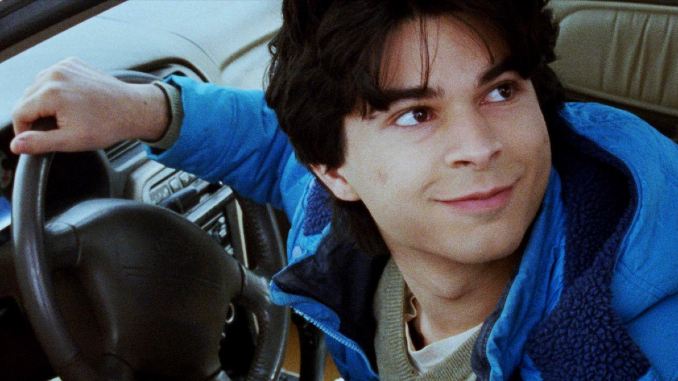Funny Pages and the Quandary of the Talented Rich Kid

Robert (Daniel Zolghadri) should be sending his cartoons to MAD Magazine. So says his art teacher and mentor, the affable, honest Mr. Katano (Stephen Adly Guirgis). Katano fosters the 17-year-old aspiring cartoonist’s evident gifts with a mix of superfluous praise and tangible encouragement. He pushes the high schooler outside of his comfort zone in order to help him grow—like when he questionably urges Robert to draw a caricature of Katano posing nude, the aftermath of which leads to a conversation that ends in tragedy. Before that, however, Katano reminds Robert that he’s already at a “professional level of drawing.” Robert is a comfortable kid from an upper class family in Princeton, New Jersey. And while seemingly self-critical, he is clearly priming himself internally to be the next big thing in comics.
That is, until Katano dies in a freak car accident in front of Robert. Suddenly, Robert’s mentally laid-out path and carefully cultivated orbit of adult approval is gone. Without Katano, Robert feels rudderless; college no longer feels quite as pertinent as it once did, and as it still definitely is in the eyes of his parents (but never was to Katano). Yet, before his beloved teacher perished, he asked Robert an important question which pulsates threateningly throughout Funny Pages like Poe’s tell-tale heart: “Who do you draw for?”
Who do you draw for? It’s an inquiry left unanswered in the film’s opening scene, a blank space which portends the narrative course of writer/director Owen Kline’s debut feature. It’s a grimy, splendidly textured film about a prodigious prep-school brat who abandons suburbia for the perceived authenticity of a struggling artist life that is as alien to him as the absence of external validation.
After Katano dies, Robert decides to take his life into his own hands. He promises his exasperated parents that he won’t be returning to high school after winter break, and he won’t be going to college either. Instead, he’s going to get a job and his own place and go the way of his cartoonist heroes—like Katano wanted for him all along. With a deal from his boss at the comics store, he acquires a near-dilapidated car to cart him to Trenton. There, the tantalizing promise of a subterranean shared apartment with questionable living standards and a second job, taking notes for public defender Cheryl Quartermaine (Marcia Debonis), hold the promise of Robert’s independence and burgeoning creative career.
Now the only thing that’s left is to find a mentor. Robert dubiously latches on to the troubled Wallace (Matthew Maher, impressively and consistently maddening), who is being represented by Quartermaine for a violent altercation at a nearby pharmacy. Wallace, though irascible, curmudgeonly and by all accounts a deeply disturbed if misunderstood person, becomes Robert’s Holy Grail. While taking notes for Quartermaine during a meeting with Wallace, Robert learns that Wallace once held the job of color-separator over at Robert’s prized Image Comics. Wallace was never an actual artist at the company, but his proximity to Robert’s industry of choice (and at such a prestigious establishment at that) is enough to turn the teen into a thorn in Wallace’s side. Not only is Wallace adamant that he doesn’t want to help Robert, but he is also unequivocal in his disgust towards even revisiting the color-separating part of his past life. Still, when Robert offers to pay him, Wallace realizes that he can (albeit, reluctantly) take advantage of the child’s shameless brown-nosing.
This depiction of talent reared by privilege and the entitlement it breeds feels personally informed by Funny Pages’ writer/director: Kline is the son of actors Kevin Kline and Phoebe Cates. He began acting in indie films as a child, most notably in Noah Baumbach’s The Squid and the Whale. But he soon abandoned the acting world, staying in school, going to college and eventually pursuing filmmaking. He became friends with the Safdie brothers (who produced Funny Pages and lent a couple of their actors), and directed a handful of short films during the 2010s.
As a character, Robert is too acutely self-reflexive to be totally oblivious, yet there’s a certain pang of uncertainty when the dialogue—molded by another artist whose creative endeavors could be securely hewn from his own upbringing and connections—sharply critiques Robert’s social class. At the same time, Kline’s privilege affords him a more intimate look at this kind of person. And it’s made clear in this interview with both Kline and Zolghadri that Kline has had a deep, lifelong passion for and fascination with the comics industry, and the often fraught careers of the people who work there. Funny Pages unfolds as if Kline sought to make a film that acts as a dialogue between the world he grew up in and the world he holds a very earnest affection for.
-

-

-

-

-

-

-

-

-

-

-

-

-

-

-

-

-

-

-

-

-

-

-

-

-

-

-

-

-

-

-

-

-

-

-

-

-

-

-

-








































